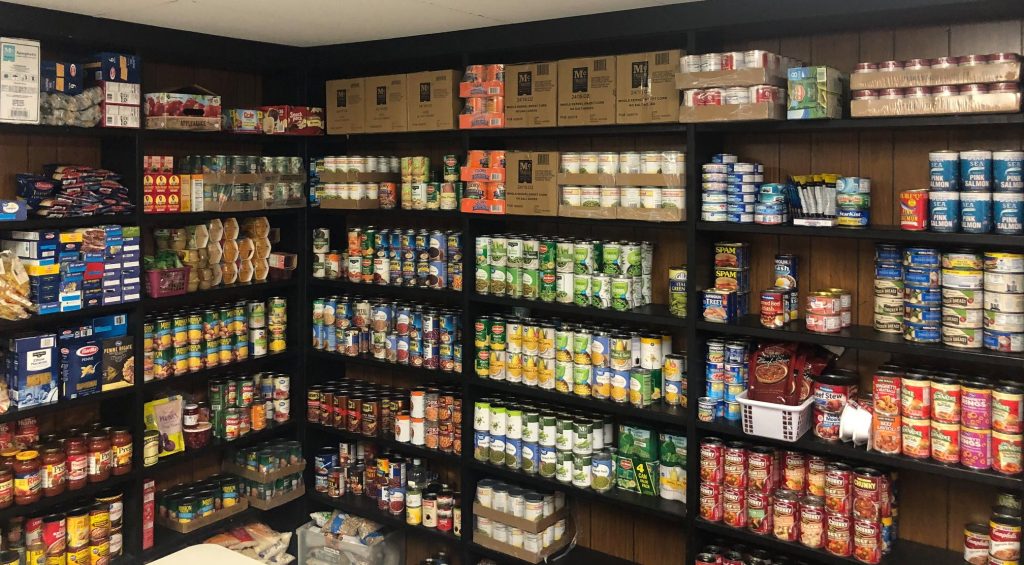Get Entailed: Sustaining Food Pantry Lockhart for a Stronger Neighborhood
Get Entailed: Sustaining Food Pantry Lockhart for a Stronger Neighborhood
Blog Article
Why Sustaining Your Neighborhood Food Pantry Is Critical for Aiding Those in Requirement
The value of sustaining neighborhood food kitchens can not be overstated, particularly in the context of food instability, which impacts a worrying number of individuals and family members within our communities. These crucial resources not just provide instant remedy for cravings yet likewise add to broader societal benefits, including enhanced health and academic results. As we explore the multifaceted function of food kitchens, it becomes apparent that their effect expands much past simply distributing food (Food Pantry Lockhart). Recognizing this deeper link may motivate a reconsideration of how we engage with and support these critical institutions.
Comprehending Food Instability
Food instability influences roughly 10.5% of families in the United States, showing a substantial public health and wellness issue that goes beyond simple hunger. It refers to the absence of consistent accessibility to sufficient food for an active, healthy life. This problem can result in a series of damaging outcomes, including bad health and wellness, increased medical care costs, and reduced academic efficiency amongst children.
The sources of food instability are diverse, frequently coming from financial variables such as underemployment, joblessness, and destitution. Geographical location can also play a vital duty, with food deserts-- areas with limited accessibility to nutritious and budget friendly food-- intensifying the issue - Food Pantry Lockhart. In addition, systemic elements, consisting of social and racial injustices, contribute to the disproportionate impact of food instability on marginalized neighborhoods
Attending to food instability is not just regarding increasing food supply; it requires a detailed strategy that includes economic security, education, and area support. Food insecurity not only affects individual health however additionally has broader implications for societal health and wellness and performance. Understanding its complexity is necessary for creating efficient interventions and promoting long-lasting services that ensure all individuals have trustworthy access to healthy food.
The Role of Food Pantries
Local food cupboards offer as important lifelines for family members and individuals encountering food instability. They supply crucial food things to those that may have a hard time to pay for appropriate nourishment because of economic challenge, unemployment, or unpredicted conditions. By distributing food at no charge, these organizations aid relieve appetite and avoid the negative health effects related to poor diet regimens.
Food cupboards frequently partner with local ranches, food store, and neighborhood companies to source a selection of healthy food products, including fresh produce, dairy, and proteins. This cooperation makes sure that pantry clients receive not just sustenance however additionally healthier options that add to total well-being.
Additionally, food kitchens function as area centers, cultivating connections among residents and providing a sense of self-respect to those in requirement. Numerous cupboards supply added sources, such as nourishment education and learning and referrals to social services, aiding customers browse their challenges better.
Basically, food pantries play a complex function in combating food insecurity. They not only address instant appetite but additionally encourage households and people to enhance their scenarios, therefore promoting community resilience and cohesion.

Benefits of Sustaining Food Pantries

Supporting food pantries not only nurtures those in demand yet also strengthens the textile of the community. By providing vital food sources, food cupboards minimize hunger and lower food instability, which is important for the health and health of families and individuals. Accessibility to healthy food adds to boosted physical wellness, much better academic end results for youngsters, and boosted mental health, thereby cultivating a much more efficient and involved community.
Moreover, sustaining food kitchens promotes social communication. These companies work as centers for neighborhood engagement, read more bringing with each other volunteers, donors, and recipients in a shared objective to battle cravings. This cooperation can damage down obstacles, foster understanding, and construct connections among diverse neighborhood participants.
Additionally, contributions to food cupboards, whether in the kind of food, funds, or time, promote the regional economic climate. Many food pantries focus on sourcing from neighborhood producers, hence supporting local agriculture and companies. This develops a cycle of support that benefits not only those in read here need yet the area as a whole.
Just How to Get Involved
Engagement with food cupboards can take several forms, enabling people and groups to make a purposeful effect in their communities. Monetary donations are also vital, as they allow food cupboards to buy fresh produce and important products.
Offering your time is one more impactful method to support local food pantries (Food Pantry Lockhart). In addition, take into consideration arranging food drives within your school, workplace, or area team to raise awareness and collect sources.
Partnerships with regional companies can even more enhance assistance for food pantries. By taking these teams, individuals and actions can considerably boost the initiatives of regional food kitchens and help those in requirement.
Area Impact and Connection
Identifying the profound influence of food cupboards on area well-being is necessary for promoting a spirit of connection and collaboration. Food kitchens serve not just as crucial resources for those facing food instability learn this here now but also as centers for neighborhood interaction. They bring together varied groups-- volunteers, donors, and customers-- producing a setting where people can attach and support each other.
The influence of food kitchens expands past simple arrangement of food; they function as a driver for social cohesion. By taking part in cupboard campaigns, community participants can create partnerships that go beyond socioeconomic barriers. This network of support helps to dismantle the stigma often related to food assistance, cultivating an atmosphere of approval and understanding.
In addition, food cupboards typically collaborate with neighborhood organizations, institutions, and organizations, amplifying their reach and efficiency. These partnerships enhance neighborhood resilience and urge a cumulative action to food insecurity. As people join in their initiatives to support neighborhood food cupboards, they cultivate a sense of common function and responsibility, enhancing the concept that everybody has a role to play in making certain that nobody goes starving. Inevitably, sustaining food pantries strengthens the material of the neighborhood overall.
Conclusion
Sustaining regional food kitchens is essential in combating food insecurity and boosting the well-being of vulnerable populaces. Engagement with food cupboards fosters neighborhood connections, advertising social communication and equity.

Report this page